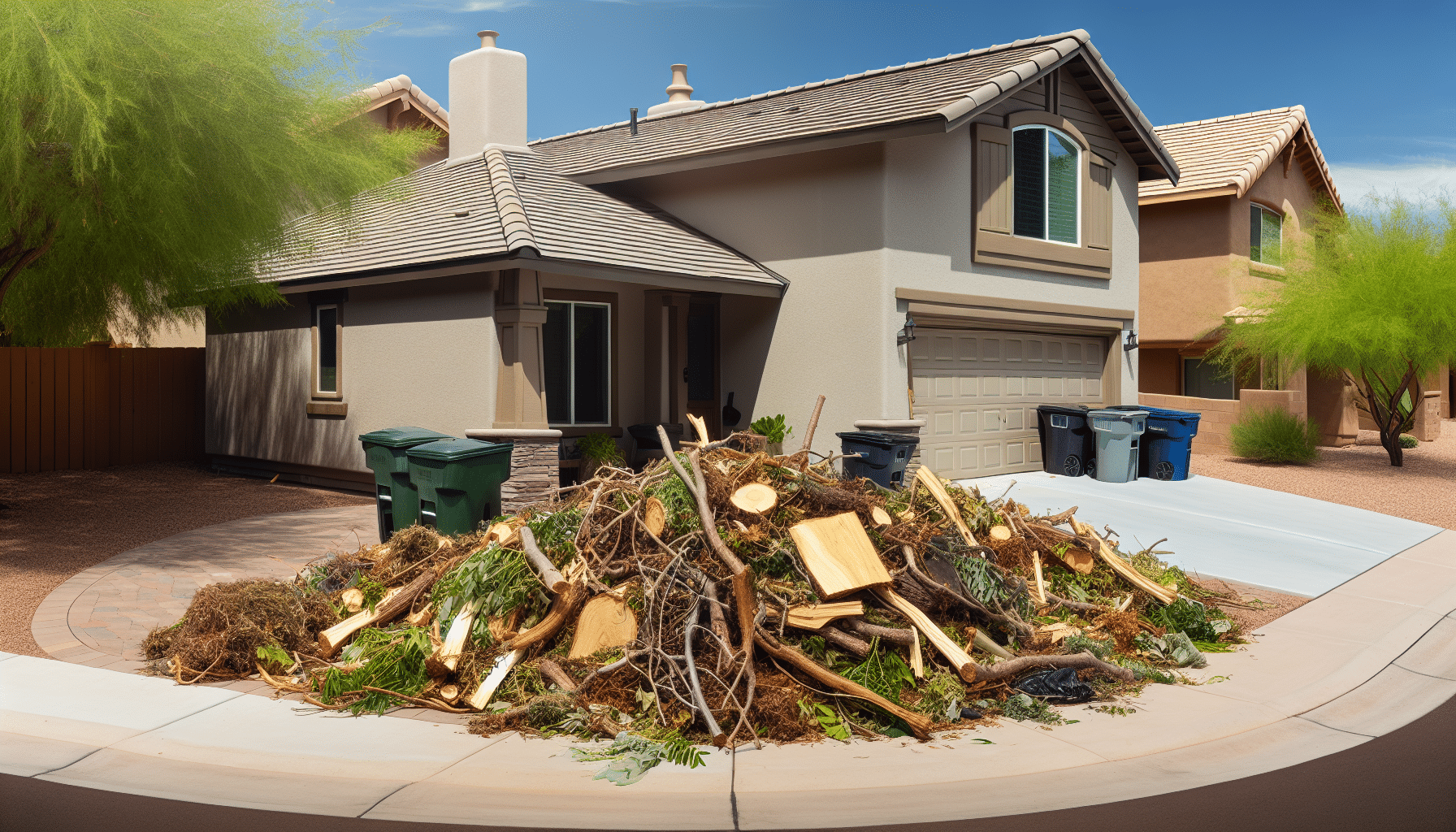At Mesa Junk Removal, we understand that a greener lawn is both a dream and a goal for many homeowners. However, dealing with Yard Debris can be quite a hassle. Luckily, we’re here to guide you through recycling this debris for a more eco-friendly lawn. This article will help homeowners like you transform yard waste into valuable resources, creating a healthier environment for your outdoor space.
Contents
- 1 Understanding Yard Debris
- 2 The Benefits of Recycling Yard Debris
- 3 Composting: A Natural Recycling Method
- 4 Mulching: Beautify and Nourish
- 5 Grasscycling: Let Nature Do the Work
- 6 Creating a Yard Debris Recycling Plan
- 7 Tools and Equipment for Recycling Yard Debris
- 8 Avoiding Common Yard Debris Mistakes
- 9 Get the Kids Involved: Fun Yard Activities
- 10 Reasons to Get Professional Help
Understanding Yard Debris
Yard debris includes grass clippings, leaves, branches, and other organic materials that accumulate in our yards. These materials, if left unmanaged, can become an eyesore and even damage your lawn. But fear not, you can actually recycle these materials and benefit your garden.
By turning yard debris into compost or mulch, you not only reduce waste but also enrich your soil. This process helps in retaining moisture, promoting plant growth, and creating a more sustainable environment. Let’s dive into the how-tos of recycling yard debris.
The Benefits of Recycling Yard Debris
Recycling yard debris isn’t just about being environmentally conscious; it’s about reaping multiple benefits right in your own backyard. By recycling what nature provides, you enhance the health and aesthetics of your lawn.
First, recycling reduces the waste sent to landfills, thus minimizing your carbon footprint. Additionally, recycled yard debris acts as a natural fertilizer, enriching the soil with nutrients. This process also encourages biodiversity, as it supports various organisms like earthworms and beneficial bacteria.
Composting: A Natural Recycling Method
Composting is one of the most effective ways to recycle yard debris. It involves the natural decomposition of organic material, transforming it into nutrient-rich compost.
Start by creating a compost pile in a corner of your yard. Add layers of green materials, like grass clippings, and brown materials, such as dried leaves. Regularly turn the pile to maintain air flow and speed up decomposition. Within a few months, you’ll have black gold to feed your garden.
Mulching: Beautify and Nourish
Mulching is another excellent method to recycle yard debris. By spreading a layer of mulch around your plants, you protect the soil, retain moisture, and suppress weeds.
You can make mulch from shredded leaves or wood chips. Spread it evenly around garden beds and trees. This not only enhances the visual appeal of your garden but also helps in keeping the soil healthy and productive.
Grasscycling: Let Nature Do the Work
Grasscycling is a simple yet effective method of recycling grass clippings. When you mow, leave the clippings on the lawn instead of bagging them.
These clippings decompose quickly, returning valuable nutrients back to the soil. This practice reduces the need for additional fertilizers and watering, making your lawn care more sustainable and less time-consuming.
Creating a Yard Debris Recycling Plan
Planning is key when it comes to recycling yard debris. A well-thought-out plan ensures you reap the maximum benefits with minimal effort.
- Assess Your Yard Needs: Consider the amount of debris your yard usually has and determine the best recycling methods.
- Gather Necessary Tools: Equip yourself with a compost bin, a mulching mower, and other tools like a chipper.
- Set Realistic Goals: Plan how much compost or mulch you wish to produce and set target dates.
- Allocate Space: Designate areas in your yard for composting and storing mulch.
- Schedule Regular Maintenance: Set reminders to turn compost piles or refresh mulch layers.
Tools and Equipment for Recycling Yard Debris
Having the right tools is essential for efficiently recycling yard debris. Equip your green thumb with helpful gadgets that make the task a breeze.
A quality compost bin is a must-have for any composting endeavor. Additionally, a mulching mower simplifies grasscycling by finely shredding clippings. Tools like chippers can help convert branches into wood chips, perfect for mulching.
Avoiding Common Yard Debris Mistakes
While recycling yard debris is beneficial, certain mistakes can hinder its effectiveness. Here’s what to watch out for as you go green.
Overloading your compost pile with one type of material can slow down decomposition. Balance is key, so mix green and brown materials evenly. Also, avoid using yard debris that’s been treated with chemicals, as this can harm your garden instead of nourishing it.
Get the Kids Involved: Fun Yard Activities
Recycling yard debris can be an educational and fun activity for the whole family. Kids can learn about the environment while getting some fresh air.
Engage your children in scouting for suitable materials for composting. Teach them how to identify different types of leaves or inspect bugs that help in the decomposition process. It’s a win-win for both the lawn and family bonding time.
Reasons to Get Professional Help
Sometimes, managing yard debris can be overwhelming, and that’s when professional help comes in handy. At Mesa Junk Removal, we offer expert services to keep your lawn pristine.
Our team can handle large volumes of debris efficiently, ensuring they’re recycled or disposed of properly. Count on us for those times when you need an extra hand or professional touch to maintain that perfect lawn.
Incorporating these practices into your routine will transform yard debris from a nuisance to a valuable resource. For assistance, contact us by phone at 480-771-1044 or Request a Free Quote.




